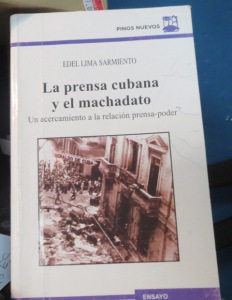The book entitled Cuban Press and the Machado Era written by Edel Lima Sarmiento, a pro-regime Cuban journalist, was published in 2014 by the Ciencias Sociales publishing house in Havana. Yet, taking into account the current situation of freedom of the press on the island, the title of the book should perhaps read Cuban Press and the Castro Era. There are more than a few similarities.

While Machado was a good ruler in the first three years after he had assumed the presidency of Cuba, the first thing he did was to use his power to control the press. Fidel Castro did the same, but in a much worse way: he forcibly took over all means of communication by spreading propaganda that allowed him to keep the regime in power.
Chapters of the above-mentioned book entitled Obedience to Caesar, A Gag and Resistance begin with a quote by Napoleon Bonaparte: “Four hostile newspapers are more to be feared than a thousand bayonets.” To demonstrate the idea of the quote, Lima Sarmiento narrates how, during the eight years of its existence, the Machado government developed an endless number of methods of fighting against opposition voices, regardless of the fact that Cuba was a democratic country at that time and that persons like Julio Antonio Mella, Jorge Fernandez de Castro, Sergio Carbo, Ofelia Rodriguez Acosta and many others enjoyed the support of renowned institutions.
Surprisingly, no part of Lima Sarmiento’s exhaustive historical research work indicates that the author was aware of the similarity between the described facts and the events in Cuba in the last 58 years. After 1959, Fidel Castro silenced practically the same number of voices in the national press as Machado did in his era, maybe even more. The two historical periods are so much alike that many of the opponents and journalists who left Cuba and lived in the exile under Machado’s dictatorship fled the country again after Fidel Castro’s arrival in Havana.
Manuel Duenas, director of the newspaper El Republicano, was one of them. He brought to our attention the case of Heberto Padilla, writer and poet, which dates back to 1971.
In 1928, after he had published an article in his newspaper entitled We are hungry, Machado! Nero is watching the destruction of Rome with an impassive face, Duenas was immediately imprisoned and sent to the La Cabana fortress prison. As if this wasn’t enough, he was also threatened with death (a subtle insinuation was made indicating that he could end up in a shark’s belly). A month later, Duenas agreed to shake hands with the dictatorship and, in order to prove it, he dedicated one issue of his newspaper to praising Machado. After that he went into exile.
In this way, the dictator managed to control an important part of the press (which had already been docile, fearful and fawning) in order to stay in power for the second term, which he cynically commented with these words: “…as long as it is requested by the majority, for the good of the country”. As soon as he was re-elected, he clipped the wings of the press even more – something that none of the presidents before him (Tomas Estrada Palma, Jose Miguel Gomez, Menocal or Sayas) had done.
Having turned his government into a bog-standard dictatorship, he then needed to prevent his enemies from publishing their opinions in their own publications; to make sure they never do, he would send (with the help of the Police) all troublesome journalists and opponents to the La Cabana prison. Some of them even lost their lives.
Thanks to Edel Lima we also learned about the successes of two prominent journalists of the Machado era, Octavio Seiglie and Rafael Iturralde, who managed to escape to exile and, using all possible means, tried to spread the word in the US press about the systematic violations in Cuba. They even engaged in their mission some US congressmen, who pressed the US government to become concerned with (and about) the situation on the neighbouring Caribbean island, reminding it of its right to intervene in Cuban internal affairs under the Platt Amendment.
In reaction to that, Machado launched a wave of counter-propaganda, glorifying the Cuban nation. Years later, the Castro regime adopted (more than once) the very same measures.

Leave a comment